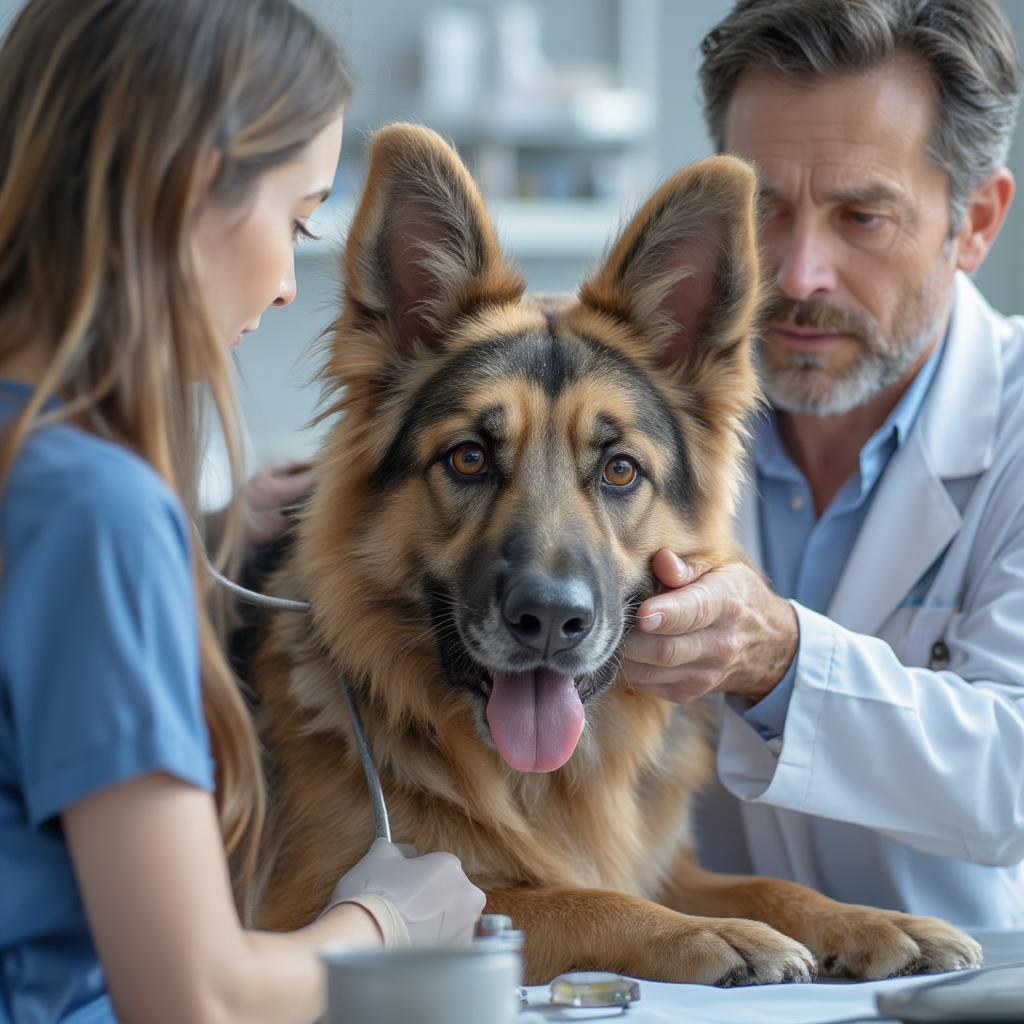German Shepherds, known for their intelligence, loyalty, and active nature, age gracefully. However, like all dogs, they eventually transition into their senior years. Understanding when this transition occurs is crucial for adapting their care and ensuring their golden years are filled with comfort and happiness. Generally, a German Shepherd is considered a senior between 7 and 10 years old.
While the number 7 is often cited, several factors can influence when a German Shepherd enters their senior phase. Size plays a significant role; larger dogs tend to age faster than smaller breeds. Since German Shepherds are a large breed, they typically reach their senior years earlier than smaller dogs. Genetics, lifestyle, and overall health also contribute to the aging process. A German Shepherd with a history of strenuous activity or health issues might show signs of aging earlier than a dog with a more relaxed lifestyle and a clean bill of health.
Factors Influencing a German Shepherd’s Senior Stage
Several key factors determine when your German Shepherd officially enters their senior years. Recognizing these factors will help you provide the best possible care.
Size and Breed
Larger dogs, like German Shepherds, generally have shorter lifespans and reach their senior years earlier than smaller breeds. This is due to the increased strain on their joints and organs. While a small dog might be considered a senior at 10 or 12, a German Shepherd typically shows signs of aging around 7.
Genetics and Health History
A German Shepherd predisposed to certain health conditions, like hip dysplasia or arthritis, might show signs of aging earlier. Knowing your dog’s family history can help you anticipate potential age-related issues.
Lifestyle and Activity Levels
A highly active working dog, like a police or military German Shepherd, may age faster than a companion dog with a less demanding lifestyle. Years of intense physical activity can take a toll on their bodies.
Recognizing the Signs of Aging in Your German Shepherd
Understanding the common signs of aging will help you recognize when your German Shepherd is entering their senior years.
Physical Changes
Look for graying fur, especially around the muzzle and face. You might also notice decreased muscle mass, stiffness, and reduced energy levels. Changes in weight, either gain or loss, can also be a sign of aging.
Behavioral Changes
Senior German Shepherds might sleep more, become less interested in playtime, or exhibit changes in their eating habits. Some dogs might become more anxious or clingy, while others might seem more withdrawn or confused. You might find resources for senior dog adoption at dogs for seniors near me.
Cognitive Decline
Cognitive Dysfunction Syndrome (CDS), similar to dementia in humans, can affect senior dogs. Signs include disorientation, confusion, changes in sleep-wake cycles, and altered interactions with family members.
Caring for Your Senior German Shepherd
Once your German Shepherd enters their senior years, adapting their care is essential to ensure their comfort and well-being.
Diet and Nutrition
Senior dogs often require a different diet to address their changing nutritional needs. Consult your veterinarian to determine the best food for your senior German Shepherd. They may recommend a diet lower in calories and fat but higher in fiber and specific nutrients to support joint health and cognitive function.
Exercise and Activity
While senior German Shepherds need less intense exercise than younger dogs, regular physical activity is still crucial for maintaining their mobility and mental health. Shorter, more frequent walks and gentle play sessions are ideal. You might find information about finding senior dogs a new home at senior dog rescue near me.
Veterinary Care
Regular veterinary checkups become even more important for senior dogs. Your veterinarian can monitor your German Shepherd’s health, detect potential problems early, and recommend appropriate treatments.
“Regular vet visits are paramount for senior dogs. Early detection of age-related issues can significantly improve their quality of life,” says Dr. Emily Carter, a veterinarian specializing in geriatric canine care.
Enrichment and Mental Stimulation
Keeping your senior German Shepherd mentally stimulated is vital for preventing boredom and cognitive decline. Provide puzzle toys, engage in gentle training sessions, and offer opportunities for social interaction. Resources for senior animal adoption can be found at senior animal rescue near me.
 Senior German Shepherd Vet Checkup
Senior German Shepherd Vet Checkup
When is a German Shepherd too old?
There isn’t a specific age when a German Shepherd is “too old.” Quality of life is the most important factor. When a dog’s pain and discomfort outweigh their joy and ability to enjoy life, it might be time to consider end-of-life care options. Discuss your concerns with your veterinarian to make informed decisions that are in your dog’s best interest. If you are looking for a smaller breed senior companion, you can search for older shih tzu dogs for adoption. Options for small dog adoption for seniors are also available.
Conclusion
Understanding the aging process in German Shepherds allows you to provide the best possible care during their golden years. By recognizing the signs of aging and adapting their care accordingly, you can ensure your loyal companion enjoys a comfortable, fulfilling life as they age gracefully. Remember, a senior German Shepherd still has much love and companionship to offer.
